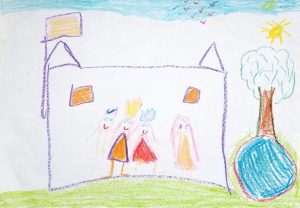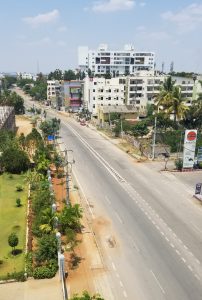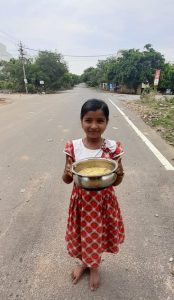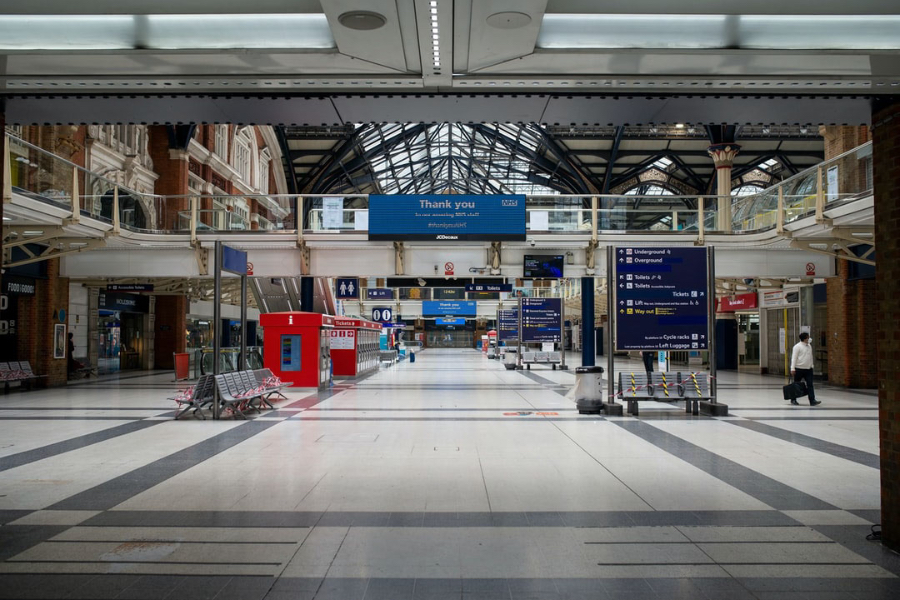As COVID-19 spreads across the world, members of the GSA community have had to face unprecedented challenges in their professional and personal lives. To stay connected during this socially distant time, GSA invites the scientists in our community to share how they are meeting these challenges, as well as their questions and worries.
If you would like to contribute to this series, please contact Communications Assistant Jacqueline Treboschi.
Guest post by Madhumala K. Sadanandappa, Ph.D. and Shivaprasad H. Sathyanarayana, Ph.D.

The authors’ five-year-old daughter drew a picture of their life in quarantine.
“Mamma, Papa, when we go back home, I would like to invite my friends for a playdate. I would like to have a family movie night. I want to go to the swimming pool, bowling alley, Montshire museum.” Our five-year-old daughter has been making this extensive list of plans for when COVID-19 is over, but, for now, no one seems to know when that will be.
Before travel restrictions and national quarantines began, our family of three took a trip to our home country, India. During our trip, we enjoyed family get-togethers, college reunions, tropical winters, savored delicacies, festive occasions, and memories that we created all through our visit. When it was almost time to say adieu to our families, friends, and our home country, everything seemed to be in order. Our passports had arrived on time, along with renewed visa stamps. Excluding the sweets and snacks that we had planned to bring back to the lab, we had checked off all the items on our to-do list; our luggage was partially packed, and our flights were on schedule.
Shortly before our planned departure, we received an email from the airline saying that they had canceled our flight. We also received several emails from our host institution and advisor about the preparation for on-campus research ramp down. Then, India announced a temporary ban on all the commercial passenger flights, leaving us only three days to depart before the restrictions were enforced. After several attempts (151!) to contact the airlines and more than an hour waiting on the phone, the customer care executive offered limited options for rebooking our flight. We initially chose to fly out on the day before the international travel ban was set to begin, but after weighing the travel-associated risks, we decided that it would be in our family’s best interest to stay. It was not an easy call, but the thought of enduring flight delays, crowded airports, and being stranded in an airport with a kid was dreadfully unimaginable. A few days later, India officially declared a complete nationwide lockdown for 21 days to fight COVID-19.
 Around the clock, we were busy catching up with the news updates, keeping tabs on the infection rates, and discussing facts about the virus and the government’s actions. We worried about our experimental animals, projects, and return to our host institution; we failed to make daily routines, stopped all physical activities, and reduced our interactions with our daughter, who was enjoying unlimited screen time. We halted our productivity in terms of manuscript writing, data analysis, literature review, attending the webinars, and networking. In many ways, it felt like the virus had hijacked our lives.
Around the clock, we were busy catching up with the news updates, keeping tabs on the infection rates, and discussing facts about the virus and the government’s actions. We worried about our experimental animals, projects, and return to our host institution; we failed to make daily routines, stopped all physical activities, and reduced our interactions with our daughter, who was enjoying unlimited screen time. We halted our productivity in terms of manuscript writing, data analysis, literature review, attending the webinars, and networking. In many ways, it felt like the virus had hijacked our lives.
A few weeks after we initially decided to stay in India, the country extended its lockdown period, and flights remained suspended. The reality of living through such a historic and unprecedented situation was challenging. While we were dealing with anxiety, helplessness, uncertainty, and social distancing, we also felt our early-career-researcher clocks ticking!
Eventually, we came up with reasonable solutions to reduce the impact that negativity was having on our physical and mental health as well as on our careers. In these trying times, we set up realistic goals and achievable plans for the coming weeks to support each other. First and foremost, we consciously avoided COVID-19 related conversations, unless it was especially important. We talked about our stress, anxiety, and gloom, and we sought advice from trusted friends and our PI. Every day, we held each other accountable for work as well as for leisurely activities that restored our energies. We diverted our obsession over virus-related news to learning new skills, attending virtual seminars, updating our social media profiles, engaging in professional networking, and supporting COVID-19-related causes.
Instead of focusing on what we can’t control, we have shifted our attention to what’s good about COVID-19 life. For instance, staying at home means being with our families during difficult times and spending quality time creating memories with our daughter. We choose to focus on thoughtful words from a supportive advisor, who said, “Be safe and healthy. We will happily welcome you when you return.” We are thankful to our lab members, who are taking care of our experimental animals, and we appreciate the scientific community and our institution in their efforts to keep us all engaged, motivated, and productive.
As we write this, longing to see each other, our daughter is still planning a family dinner, birthday celebration, and playdates with her friends. Her positive outlook is unaffected by the rate of infection, vaccine research, the new proclamations, the lockdown extensions, or the travel bans. Her innocence and trust reassure us that this time will pass, and sooner or later, we will all return to our normal life. Until then, stay safe, stay healthy, and be positive.
About the Authors
Madhumala Sadanandappa and Shivaprasad Sathyanarayana are Postdoctoral Research Associates in the Bosco Lab at the Department of Molecular and Systems Biology, Geisel School of Medicine at Dartmouth, Hanover, NH. Madhu is a member of the GSA’s Conference Childcare Committee.































